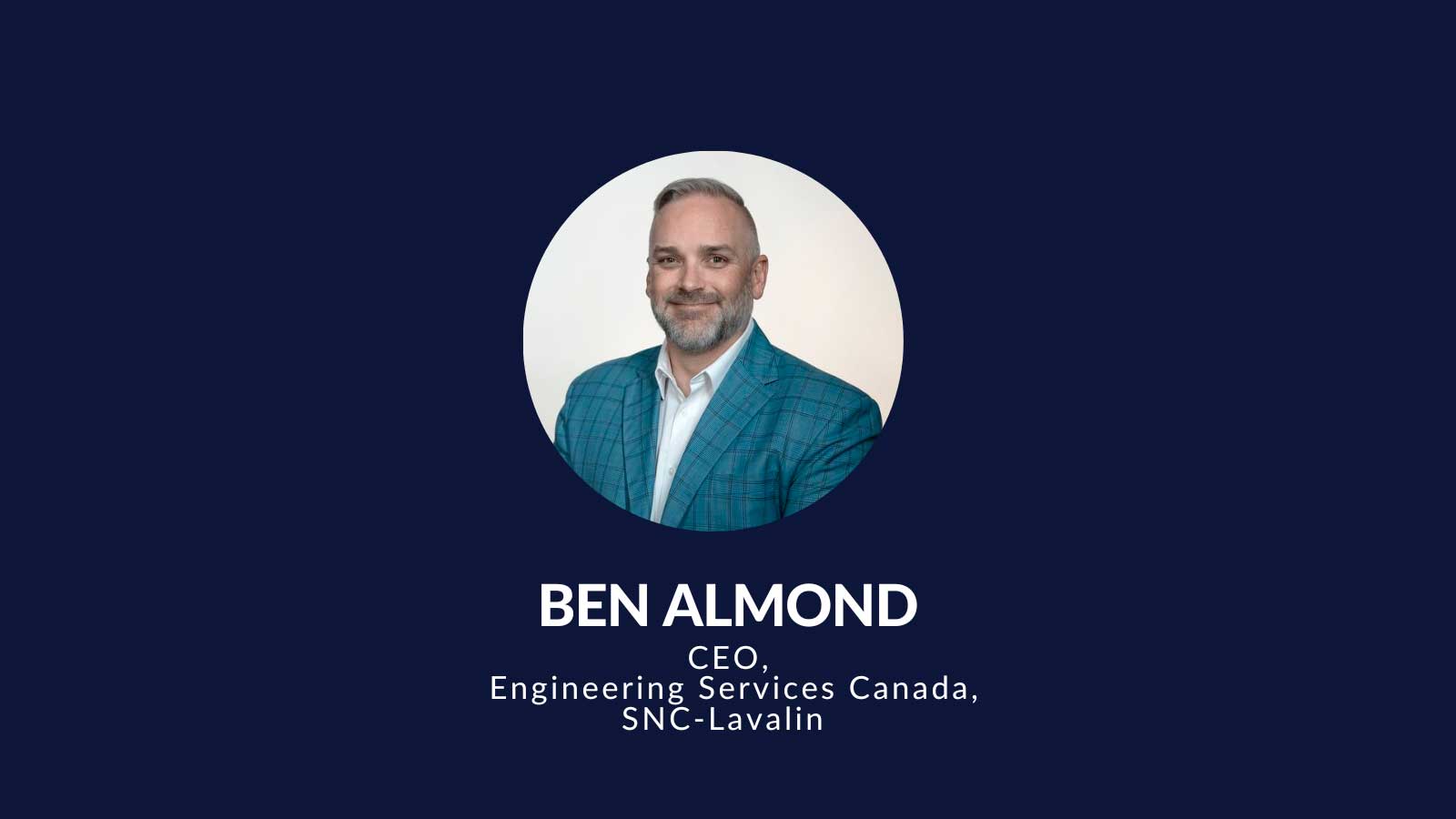CityAge spoke with Ben Almond, SNC-Lavalin’s CEO, Engineering Services Canada, about how data can help us get to net zero and how we all need to play a part in decarbonization. Ben was a speaker at CityAge’s Canada’s Next 10 Million Event this past April in Toronto, where attendees discussed the question: How can Canada build better cities to accommodate its rapidly expanding population while maintaining urban livability? You can read a Summary Report of that event here.
This conversation has been condensed and edited for clarity.
CityAge: Is Canada on track to reach net zero by 2050?
Ben Almond: I don’t believe so. If you look back at greenhouse gas emissions, for example, between 2005 and 2019 we’ve only reduced greenhouse gas emissions by just over 1%. To reach our 2030 goal, [we need] 45% reductions. … It’s a daunting task and we’re not on the right pace.
CityAge: What do we need to do collectively to get on the right track?
Almond: We’ve got to make some significant changes in our behavior. First, hitting 2030 means we have to disrupt ourselves. We have to change the way we’re approaching this problem, seek quick wins in the environment that we have today. We need to look at this from a systematic approach and look for the highest return on carbon reduction that we can find based on the investments we are able to make.
We have to unlock funding. Every community that I talk to has great ambitions but is struggling with infrastructure growth. At the same time they’re trying to reach net-zero goals and the money’s limited. So they’re forced to prioritize in a way that really reduces the progress they’re able to make. Seven years is going to go by very quickly, so we’ll be hit with 2030 very soon, and we really need to shake ourselves up right now. If we’re going to meet our 2050 goals, we need to elevate our thinking. We need to start to think more broadly, bring together groups that include federal, provincial, municipal, as well as industry, and build one cohesive plan for how we’re going to achieve net zero across the country. And that means we’re going to have to break down some political barriers and take on the hard challenges. If we’re going to be successful in this journey, we need to embrace a new world, a new way of doing things, a new approach to how we buy, use, and dispose of the things in our lives.
CityAge: What’s SNC doing to help?
Almond: We’re involved in most of the nation’s most iconic infrastructure projects, so we have a chance to put a fingerprint on the future of the nation. And when we’re trying to live up to our purpose – which is engineering a better world for our planet and its people, and for us that means everything we touch – we bring a different view on that to try and progress us on this path. We don’t get to make all those decisions, but we can arm people with the right information to make those decisions, make some recommendations. And on our own part, we’re investing in data-driven tools and solutions that help our clients and communities that we work with elevate their thinking. [This will help them] be able to choose where they invest for maximum returns so they can progress towards 2030 and 2050 goals in a way that maybe others won’t if they’re simply going for the lowest hanging fruit.
CityAge: What’s one thing you wish people knew about the road to net zero that you think they don’t?
Almond: I wish people knew and embraced that this isn’t just about buying an electric car. This is about decarbonizing our buildings, decarbonizing the way we live our life and the way we take in consumer goods. This is about looking at our energy supply chain. And how we move from where we are today to where we need to be in 2050 means we actually have to invest in some green infrastructure. And none of this is going to happen if we just continue to do what we’ve always done. We’ll still be here talking about how we are going to meet 2075 goals and they’ll be the same goals if we don’t take this on differently. So the biggest thing I really want people to embrace is that this isn’t a single switch that we flip – it’s changing the way we look at the problem and seeking new ways to address a different outcome.
CityAge: How can data help us achieve net-zero goals?
Almond: Data is going to be paramount for us to meet these goals. We have some real limitations as a society, as a country – and every region has their own. And one of the biggest limitations is time. Another major limitation is money. There’s only so much of those two to go around. And if we’re going to make major progress, we have to use data-driven decision-making. Our history is baked in following our instincts on these things. And we lack any of the historical experience to be able to drive the right outcomes through instinctual decision-making. So data has to be at the center of every decision that we make, and [we have to] allow it to guide us down that path where we’ll make some really big early steps. And over time we’ll be able to choose where we invest those valuable dollars and minutes wisely in order to make further progress towards net zero.
CityAge: What’s important to know about Canada’s energy supply chain?
Almond: There’s something people need to understand around that energy supply chain and the backlog of new green power that we need to develop here in Canada. It equates to about tripling the volume of power generation here in Canada. And that’s going to come through hydro – which we all think of as green – solar, and wind, which are great for taking the peaks off of capacity demand. But they’re not reliable. They’re very spiky when it comes to production. Then the one that a lot of people get scared of is nuclear. And many people don’t realize how significant of a nuclear power generation network we have here in Canada. We’re one of the leaders in the world in terms of nuclear power. And it is safe, it is green; don’t worry about it being in your backyard. In fact, you should desire it because it’s good for this country. It’s good for the future of all of us. And I’d love for people to be able to embrace some of the places where Canada’s been on the leading edge of technology development over the decades, over the century. And that will be a significant part of our future.




